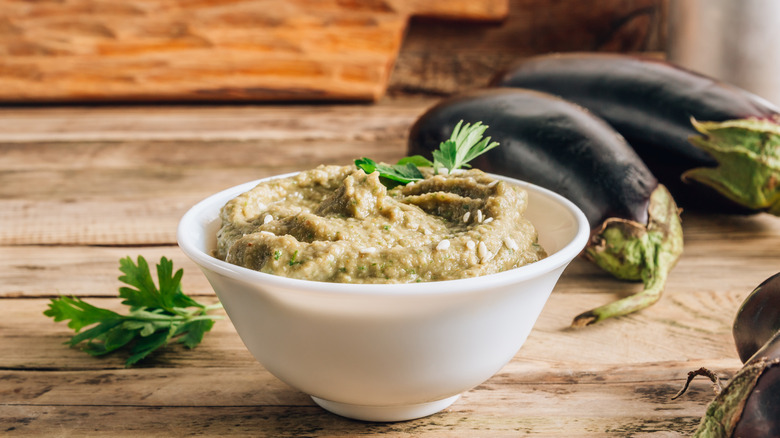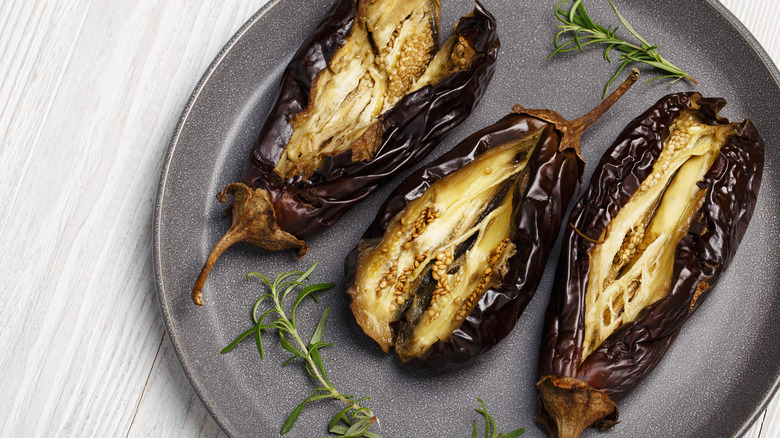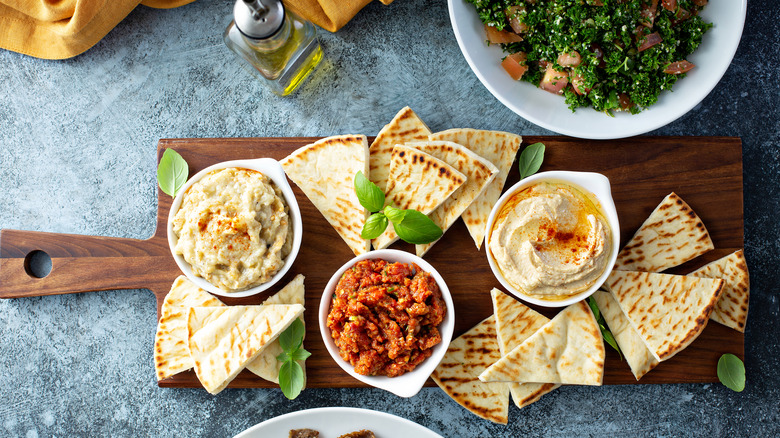The Literal Meaning Of 'Baba Ganoush' Is Hilarious
If you are a dips, hummus, or eggplant fan, there is a good chance you've already sampled your share of baba ganoush. This creamy, smoky, flavorful dip doesn't need much more than a slice of pita bread to complete a rich, delicious, crowd-pleasing snack. And while it can easily be found in most grocery stores, it is also pretty simple to make from scratch. All you really need is eggplant, tahini, salt, lemon juice, and any other spices you fancy. While garlic is the most common additive, other flavorful spices, like mint, parsley, cumin, cayenne, and sumac, can also take baba ganoush up a notch, per the Encyclopedia of Jewish Food.
To prepare, roast the eggplant – preferably over an open flame to give it a rich, smoky flavor — then mash it, and add tahini, salt, lemon juice, and garlic to taste. Blend it, and there you have it- your homemade baba ganoush, made fresh to order, according to Inspired Taste. Due to its relatively simple ingredients, it might not surprise you to learn that baba ganoush has been around for a long time.
The exact origins of baba ganoush are unknown
Although its exact origins are difficult to pinpoint, it is believed that baba ganoush was likely invented in the Levant sometime around the 13th century, according to Britannica. However, exactly who gets credit for this dish is somewhat disputed. Some stories give credit for its founding to a young Syrian girl who came up with the mashed eggplant dish to feed her elderly, toothless father, according to Feast in the Middle East. However, others believe that the dish we think of as true baba ganoush was first created in Lebanon, per the Encyclopedia of Jewish Food.
Regardless, some version of this eggplant dish has been found around the Middle East for thousands of years. A slightly spicier version of this dish, known as mutabbal, contains some minor differences, including the addition of more spices and the substitution of yogurt for tahini. However, while there may be some slightly different variations of this dish, baba ganoush is probably the most well-known version worldwide. And the name, Arabic in origin, has a rich history.
Baba is a term of endearment, meaning father or daddy in Arabic. Ganoush is commonly translated to spoiled or pampered, according to Grammarphobia. Baba ganoush is translated to spoiled daddy or pampered daddy. But where exactly did this playful name come from?
Baba ganoush means spoiled daddy
Much like the origins of baba ganoush itself, multiple stories explain how the dish got its name. In Syrian folklore, the daddy in question may be the father for whom the dish was created, per Feast in the Middle East. Other stories explain that the name came about because it was a relatively simple dish to make and, therefore, easy for children to make for their parents. Children would often serve it while jokingly asking, "look, see how spoiled my dad is?" according to the USC Digital Folklore Archives.
However, some narratives indicate that baba ganoush may have even been invented in a royal harem. In those stories, the daddy in question may have even been a sultan who was pampered by the women in his harem with this rich dish, as Grammarphobia suggests. However, the Encyclopedia of Jewish Food notes that it's unknown if baba refers to a person or the fact that the eggplant is one of the biggest — or most important — vegetables. Regardless of how exactly this funny name came about, it might be hard to think of baba ganoush the same way the next time you serve this delightful dip.


